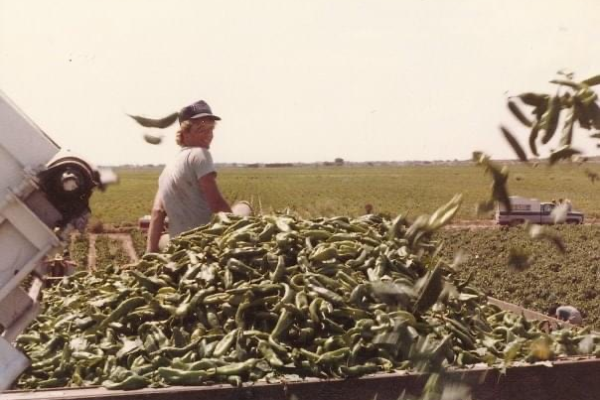Bo Berg is a director in Perficient’s financial services practice. He has more than 20 years of experience leading digital transformation initiatives for financial institutions.

Bo Berg joins Eugene Sefanov and Madeline McDermott for a Microsoft Teams chat
Denmark, Dogs, & DJing
Madeline McDermott: First things first. Where were you born?
Bo Berg: Copenhagen. Denmark, to be specific.
MM: What brought you to the U.S.?
BB: I was an exchange student in Las Cruces, New Mexico. I lived there for a few years with a farming family; I call the host parents Mom and Dad to this day. They planted pecan trees, cotton, and chilis.
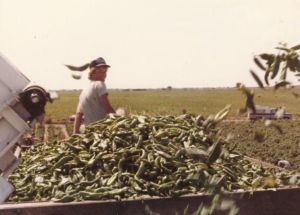
Bo at the farm in Las Cruces, 1982
Bo’s dog barks in the background.
MM: Now I have to ask, what kind of dog do you have?
BB: I have a giant schnauzer. He is my fifth giant schnauzer. His name is Baldr, which is the half-brother of Thor. He is a protector and lover.
MM: So, after some time in New Mexico, you went back to Denmark. What did you do in Denmark, and when did you return to the U.S.?
BB: When I was 14 years old, I figured out that I was good at putting music together for people. So, a few guys and I got together and started DJing, and it became a career for me. I was a club DJ in Copenhagen for several years, and that turned into radio broadcasting and traveling the world interviewing music celebrities in the eighties. When I turned 26, though, I was burned out from spending every weekend at a party. I wanted to do something different, and I had always wanted to go back to the U.S.
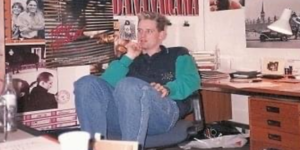
Bo in his office at the radio station, The Voice, 1987
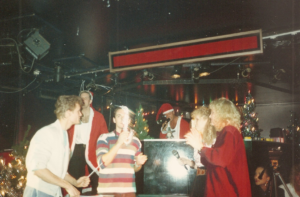
Bo and friends at Daddy’s Christmas Party, a Copenhagen nightclub, around 1990
MM: Did you DJ in the states, too, or only in Denmark?
BB: I did a couple of gigs here, and I tried to do some broadcasting. There was a recession going on, though, so I stopped.
Programming, Perficient, & Planning
MM: What happened next?
BB: In 1992, I discovered these online bulletin boards, where you could communicate with people all around the world. In 1993, a guy from the University of Michigan came up with something called Mosaic, which was a browser. I discovered it, and coming from a broadcasting background, I thought it was amazing. I had my little dial-up, and I taught myself programming and started to produce websites. I went on to create some of the first banking sites and many entertainment websites. I developed the sites for Dawson’s Creek and 7th Heaven. I eventually got headhunted to work for City National Bank in Los Angeles. That’s when I started to get deep into the financial space.
MM: Essentially, you got into banking because of your web development experience?
BB: Yes.
MM: So, you started at City National Bank, and was the bank online before you got there?
BB: A bit, but they really wanted to expand it.
MM: How long were you at the Bank?
BB: 19 years. I was one of the 24 first IT people, and when I left, the IT group had no less than 300 people.
MM: You played a variety of roles at City National Bank. Were you always in IT?
BB: I’d say I was an internal consultant between the IT and business sides. On the business side, I helped with strategic planning. On the IT side, I helped deliver on the business priorities.
MM: You were there for 19 years, and then Perficient came along?
BB: Well, I spent a few years as an independent consultant. I got deep into payment networks and worked closely with advisory boards. I spent a lot of time educating them on blockchain and cryptocurrency and helping them understand how it fits in their business models.
MM: Perficient came along after a couple of years of consulting, then?
BB: Yes, I was in conversation with several individuals at Perficient. I had worked with them before as a client and was very impressed. Perficient was impressed, and they asked if I’d come on board. It was perfect timing for me. With the world opening back up and investments coming back, I feel we’ve really geared ourselves to face new challenges.
MM: Paint a picture for me. What do you do for Perficient?
At Perficient, I’m a director in the financial service practice. I touch a variety of sub-industries, including retail banking, commercial banking, and payments. I have a lot of experience with core systems, credit cards, and rewards programs. Being where I am now, I feel like I have a significant amount of resources to help support financial clients across the board.
MM: Let’s go back to crypto. What does the future hold for cryptocurrency? How do you think it will change the way financial services organizations operate?
BB: Banks and financial institutions have always been good at putting certain currencies in a box. The customer really doesn’t care what the technical instrument underneath it is when they move money. For example, say a customer wants to move money from point A to point B. They want options for how much that will cost them. When you ship a package, you have options. Overnight shipping will cost you more than three-day shipping. Why not give banking customers options? Over time, I think we will see consumers have more choices. It’s about putting the customer in the driver’s seat. Cryptocurrencies will play a major role in this.
I also think a lot about wealth management. Will institutions view Bitcoin as an asset — the same as automobiles, stock, bonds, art, and real estate? Can they advise on it? Will people be able to start paying with Bitcoin or other cryptocurrencies? I think we eventually will, even though the federal government will encounter challenges with it. They will fight it tooth and nail to see these transactions at least be funneled through them.
MM: What’s the last thing you discussed with the client?
BB: We have several clients right now asking if they should accept cryptocurrency as payment, and they’re curious to know how this would potentially look.
Rapid-Fire Questions
MM: Favorite book?
BB: Papillion by Henri Charriere
MM: Favorite brands?
BB: Lego. It allows for creativity and playfulness. Also, Prince (yes, I consider it a brand!), Apple, Kiehl’s, and Volkswagen.
MM: Hobbies?
BB: Biking. I’ve biked since I was 15. And music – it has to be on all the time.
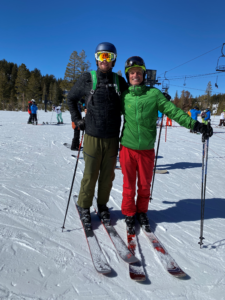
Bo and his son, Aleksander, skiing in Mammoth, CA, 2020

Bo near White Mountain Peak in Bishop, California, 2011
MM: Coffee or tea?
BB: Definitely coffee. The engineering of the machine is what makes coffee good or bad.
MM: Favorite thing to eat?
BB: Sushi.
MM: Are you a person that likes to have to-do lists?
BB: Absolutely, I like to make CPR lists, which stands for Context, Purpose, Results.
MM: Do you prefer email, phone, or instant messages at work?
BB: IM for sure. Email isn’t as productive. It takes too long to answer an email. I love connecting in real time.
MM: What about outside of work?
BB: I love that we have learned to take advantage of Zoom and FaceTime during the pandemic. It’s fantastic.
MM: Most famous person you’ve met?
BB: Muhammad Ali. I was starstruck. I stood next to him and his daughter, and I couldn’t say a word.
MM: Favorite sport?
BB: Football (soccer), Liverpool FC
MM: What are you obsessed about most?
BB: Organizing. I like everything to be neat. It’s why I love Lego.
MM: Pet peeves?
BB: When people don’t keep their word. I have to remember to keep my word, too.
MM: What do you want your clients and prospects to know about you?
BB: I’m passionate about solving business problems. I strive to make my clients and the people I work with shine.
It’s no secret our success is because of our people. No matter the technology or time zone, our colleagues are committed to delivering innovative, end-to-end digital solutions for the world’s biggest brands, and we bring a collaborative spirit to every interaction. We’re always seeking the best and brightest to work with us. Join our team and experience a culture that challenges, champions, and celebrates our people.
Learn more about what it’s like to work at Perficient at our Careers page.
Go inside Life at Perficient and connect with us on LinkedIn, YouTube, Twitter, Facebook, and Instagram.
